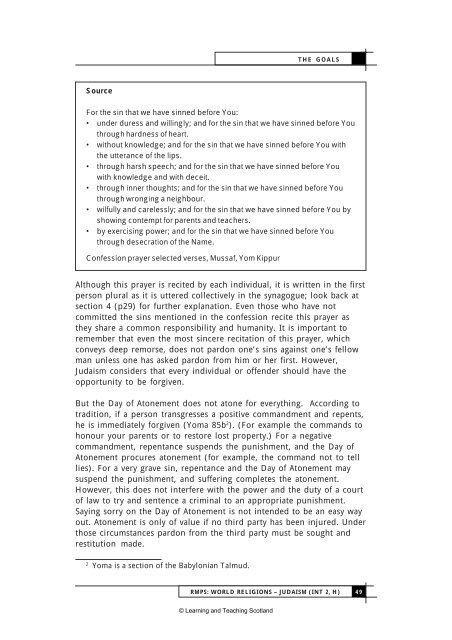RMPS - Int2/Higher - World Religions - Judaism - Education Scotland
RMPS - Int2/Higher - World Religions - Judaism - Education Scotland
RMPS - Int2/Higher - World Religions - Judaism - Education Scotland
Create successful ePaper yourself
Turn your PDF publications into a flip-book with our unique Google optimized e-Paper software.
Source<br />
THE GOALS<br />
For the sin that we have sinned before You:<br />
• under duress and willingly; and for the sin that we have sinned before You<br />
through hardness of heart.<br />
• without knowledge; and for the sin that we have sinned before You with<br />
the utterance of the lips.<br />
• through harsh speech; and for the sin that we have sinned before You<br />
with knowledge and with deceit.<br />
• through inner thoughts; and for the sin that we have sinned before You<br />
through wronging a neighbour.<br />
• wilfully and carelessly; and for the sin that we have sinned before You by<br />
showing contempt for parents and teachers.<br />
• by exercising power; and for the sin that we have sinned before You<br />
through desecration of the Name.<br />
Confession prayer selected verses, Mussaf, Yom Kippur<br />
Although this prayer is recited by each individual, it is written in the first<br />
person plural as it is uttered collectively in the synagogue; look back at<br />
section 4 (p29) for further explanation. Even those who have not<br />
committed the sins mentioned in the confession recite this prayer as<br />
they share a common responsibility and humanity. It is important to<br />
remember that even the most sincere recitation of this prayer, which<br />
conveys deep remorse, does not pardon one’s sins against one’s fellow<br />
man unless one has asked pardon from him or her first. However,<br />
<strong>Judaism</strong> considers that every individual or offender should have the<br />
opportunity to be forgiven.<br />
But the Day of Atonement does not atone for everything. According to<br />
tradition, if a person transgresses a positive commandment and repents,<br />
he is immediately forgiven (Yoma 85b 2 ). (For example the commands to<br />
honour your parents or to restore lost property.) For a negative<br />
commandment, repentance suspends the punishment, and the Day of<br />
Atonement procures atonement (for example, the command not to tell<br />
lies). For a very grave sin, repentance and the Day of Atonement may<br />
suspend the punishment, and suffering completes the atonement.<br />
However, this does not interfere with the power and the duty of a court<br />
of law to try and sentence a criminal to an appropriate punishment.<br />
Saying sorry on the Day of Atonement is not intended to be an easy way<br />
out. Atonement is only of value if no third party has been injured. Under<br />
those circumstances pardon from the third party must be sought and<br />
restitution made.<br />
2 Yoma is a section of the Babylonian Talmud.<br />
<strong>RMPS</strong>: WORLD RELIGIONS – JUDAISM (INT 2, H) 49<br />
© Learning and Teaching <strong>Scotland</strong>
















